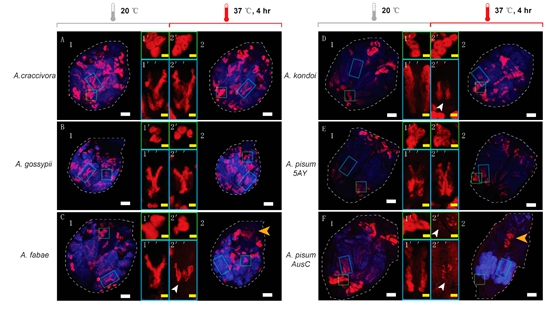The Mechanism of Obligate Endosymbionts Limiting Thermal Tolerance of Host Species Was Revealed
Recently, Dr. Zhang Bo from the Innovation Team for Protection and Application of Insect Natural Enemies of IPP-CAAS published a paper entitled “Obligate Bacterial Endosymbionts Limit Thermal Tolerance of Insect Host Species” in Proceedings of the National Academy of Sciences of the United States of America (PNAS), confirming that the heat sensitivity of aphid endosymbionts contribute to host variation in heat tolerance.
Thermal tolerance is a basic determinant of an organism’s ecology: the ability to survive and to reproduce in the face of variation in temperature affects geographic range, competitive ability, and population dynamics. Many animals and plants engage in intimate symbiotic interactions with microorganisms, and these symbionts can impact thermal tolerance. When hosts are dependent on symbionts that are themselves heat-sensitive or cold-sensitive, the host’s temperature range and geographic distribution may be curtailed by the symbiosis. Aphids and their intracellular bacterial associates, Buchnera aphidicola, are a central widely studied model of obligate symbiosis. Buchnera has diversified with aphids through maternal transmission for >100 million years; their tiny genomes encode less than 600 proteins but retain genes underlying production of amino acids needed for host nutrition. Several observations suggest that Buchnera is heat-sensitive. The hypothesis is whether aphid heat tolerance is determined by Buchnera and whether variation among aphid species in heat tolerance is linked to variation in Buchnera’s tolerance, because aphid species vary widely in heat sensitivity.
This study documented aphid survivorship and reproduction following heat challenge in five widely distributed aphid species chosen on the basis of apparent differences in thermal tolerance, partly reflected in geographic ranges. Aphis craccivora and Aphis gossypii are generalist crop pests distributed worldwide in warm,temperate,and tropical regions, whereas Aphis fabae is a generalist that is most common in cool regions, including northern Europe and Canada. Acyrthosiphon kondoi and Ac. pisum specialize on alfalfa and favor cool environments. The authors included a second Ac. pisum line in which Buchnera bears a single nucleotide deletion in the ibpA heat shock promoter, increasing heat sensitivity. They also quantified symbiont titers following heat exposure, visualized bacteriocytes with and without heat exposure, and explored the genomic and transcriptional underpinnings of heat responses in both aphid host and Buchnera. Fecundity following heat exposure is severely decreased by a Buchnera mutation that suppresses transcriptional response of a gene encoding a small heat shock protein. Similarly, absence of this Buchnera heat shock gene may explain the heat sensitivity of Ap. fabae. Fluorescent in situ hybridization revealed heat-induced deformation and shrinkage of bacteriocytes in heat-sensitive species, but not in heat-tolerant species. Sensitive and tolerant species also differed in numbers and transcriptional responses of heat shock genes. While heat-induced responses of aphid hosts themselves also may contribute, symbiont ability to withstand heat appears to be a central determinant of host thermal range.
This paper resulted from collaboration between Assoc. Prof. Zhang Bo at IPP-CAAS and Dr. Nancy A. Moran’s research group at University of Texas Austin. The work was supported by the China Scholarship Council and the Science and Technology Innovation Program of CAAS.

More details are available at the link below:
https://www.pnas.org/content/pnas/early/2019/11/12/1915307116.full.pdf
By Zhang Bo (Zhangbo05@caas.cn)
-
 Apr 18, 2024Opening Ceremony of the Training Workshop on Wheat Head Scab Resistance Breeding and Pest Control in Africa Held in CAAS
Apr 18, 2024Opening Ceremony of the Training Workshop on Wheat Head Scab Resistance Breeding and Pest Control in Africa Held in CAAS -
 Apr 03, 2024IPPCAAS Co-organized the Training Workshop on Management and Application of Biopesticides in Nepal
Apr 03, 2024IPPCAAS Co-organized the Training Workshop on Management and Application of Biopesticides in Nepal -
 Mar 28, 2024Delegation from the School of Agriculture and Food Science of University College Dublin, Ireland Visit to IAS, CAAS
Mar 28, 2024Delegation from the School of Agriculture and Food Science of University College Dublin, Ireland Visit to IAS, CAAS -
 Mar 25, 2024Director of World Food Prize Foundation visited GSCAAS
Mar 25, 2024Director of World Food Prize Foundation visited GSCAAS -
 Mar 20, 2024Institute of Crop Sciences (ICS) and Syngenta Group Global Seeds Advance Collaborative Research in the Seed Industry
Mar 20, 2024Institute of Crop Sciences (ICS) and Syngenta Group Global Seeds Advance Collaborative Research in the Seed Industry
